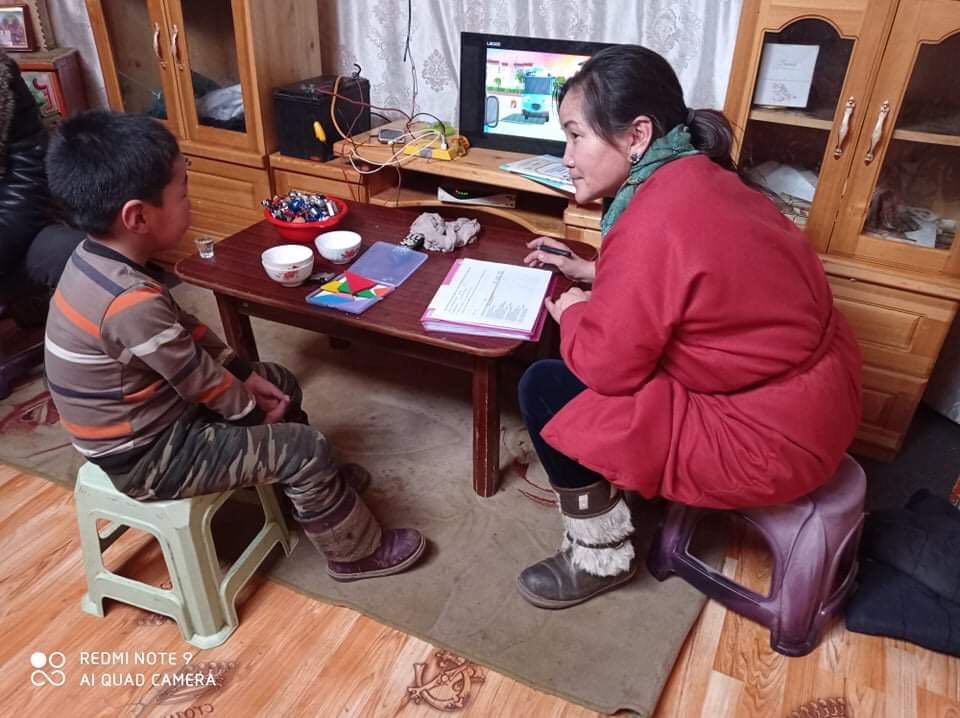In Mongolia, our comprehensive preschool project helps thousands of nomadic children take the first important step into school life.
Reading time 5 min.
For nomadic children in rural Mongolia, starting school is not just a new day – it’s a change in life trajectory. And for many of the youngest children in nomad families, starting school without any kind of preparation a la kindergarten is a big change.
That’s why the Better School Start – Better School Life project was launched back in 2019: an initiative that combines educational support, social development and a focus on the active role of the family to ensure that 5-year-old children – no matter where they live – have a safe and happy start to school.
‘My son is the continuation of my life,’ says a young father proudly as he sees his boy sitting with his first school book.
A different kind of school preparation
The project aims to reach children who do not have access to regular kindergarten. Instead, they are taught through alternative pre-school education – often in the home, supplemented by local groups – supported by workbooks, teachers and parental involvement.
The goal is to strengthen children’s school readiness – both academically and socially. While many children learn to write their name and count to ten, the social aspect is a particular challenge for children who have grown up far from communities and institutions.
‘The children could solve simple maths problems, but had difficulty talking to teachers. They were shy and some only answered with one word – or not at all,’ says a teacher from Uvurkhangai province.
Our project was originally inspired by data that showed that 80% of all children who dropped out of school in the first few years were nomadic children.
Parents play the main role
Not surprisingly, the project has shown that parents are crucial. Not as passive supporters – but as active educators. With audio stories on the phone, videos on Facebook and physical visits to the school, parents become an important part of their child’s learning journey.
In the village of Galt, a group chat called ‘A Good Start to School’ was set up where 46 parents, teachers and volunteers regularly exchange photos, questions and encouragement. One mum uploads a video of her daughter reciting ancient Mongolian proverbs. Another proudly shares a drawing.
In Ulaan-Uul in northern Khuvsgul, almost 1000 kilometres from the capital, 30 five-year-old children were included in the project. Many live in areas without good mobile phone coverage. Here, QR codes were used to share stories offline – and in Selenge province, audio files were shared on memory cards. The often difficult or impossible access to modern tools and infrastructure inspires impressive ingenuity among Mongolian teachers.
From pencil to life skills
School readiness is not just about being able to write letters and count. It’s also about being able to wait your turn, understand rules, speak your mind and empathise.
That’s why the project now uses methods from SEE Learning (Social, Emotional & Ethical Learning) – an approach that promotes empathy, emotion regulation and co-operation, inspired by experiences from the exiled Tibetan community with strong support from the Dalai Lama. It has re-energised teaching and inspired teachers to develop their own micro-projects.
‘Goodness means quality, health and wisdom,’ goes a Mongolian proverb. It could also have been the title of the project.
Results and visions
During the 2024-2025 school year, 1,000 workbooks and parent guides were printed and distributed during the project. Since 2020, we have reached over 4,500 nomad children, even though the first two years were ravaged by the corona pandemic with closed schools and extensive bans on all forms of domestic travel.
Assessments show that over 40% of children are at a high level of school readiness, 32% are considered to be at an intermediate level, and the rest are lagging behind and need extra attention when they start school.
The Mongolian Ministry of Education conducts annual random tests of students’ academic and social skills in first grade. So far, the nomadic children involved in the project’s home-based school preparation programme are performing on par with those who have attended kindergarten.
The project and the national challenge
In June 2022, a ministerial regulation on alternative early childhood education was issued. This regulation makes it mandatory for 5-year-old children to participate in certain activities and trainings, including 80 hours of community group and 120 hours of family-based training per school year to ensure school readiness. The 80 hours of community group typically takes place over a few weeks during the summer holidays, where nomad children can either go to the village centre kindergarten or to the ger kindergarten set up in their bagh (small administrative area).
Despite the efforts of the government and our project, the need is still great. Finances do not allow us to include all 5-year-olds in the 62 districts where the project is implemented. There are no similar initiatives in the other 238 districts.
Over 30,000 nomadic children do not yet have access to kindergarten and probably never will. They live too far from the village centre and families cannot/will not move or split up.
The project is in its final phase and we are increasing the collection of experiences and results. We and our Mongolian partner have no doubts: the Mongolian government should continue the effort and expand the initiative to all rural areas.
Converted into Danish kroner and based on four years of experience, the project’s efforts with home-based school preparation for the nomads’ five-year-old children have cost somewhere between DKK 205 and 320 per child. Even in Mongolia, that’s not a lot of money.



